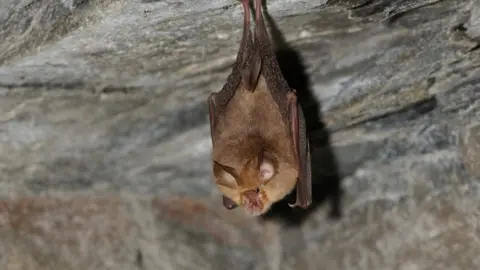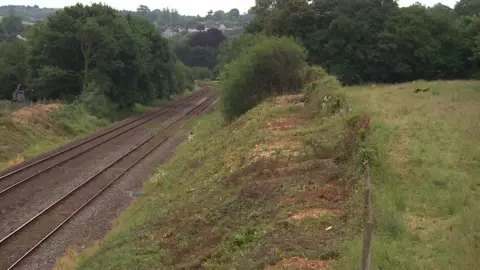Rare horseshoe bat concerns Kingskerswell railway tree felling
 Getty Images
Getty ImagesConcerns for a rare bat species have prompted a council to stop Network Rail felling trees along a railway line.
It is clearing vegetation along its railways for safety reasons.
But Teignbridge District Council put a preservation order on trees along a stretch of the line at Kingskerswell, Devon, following concerns for the local greater horseshoe bat population.
A spokesman for Network Rail said it was working with the council "to find a way forward".
The council says wildlife experts claim the bats use the trees for navigation.
Councillor Humphrey Clemens, who is responsible for planning in the district, said he could understand if Network Rail wanted to remove "limbs" affecting the train line, but removing whole trees caused "too much damage to be acceptable".
"We don't want fall out with Network Rail, we just want them to come back with evidence where trees are a danger and we will happily agree to them being removed or pruned," he said.

Ed Parr Ferris, a conservation manager at Devon Wildlife Trust, says networks and lines of trees in south Devon are "critically important" and help the bats navigate via "echo location", where they make calls as they fly and build a sonic map from the returning echoes.
The Bat Conservation Trust say the rare species is now confined to the south-west of England and South Wales.

Greater horseshoe bats:
- They are also known by their scientific name Rhinolophus ferrumequinum
- It is one of 16 bat species found in Britain
- With wingspans of up to 40cm (16ins), they are also one of the largest
- They get their name from the horseshoe-shaped organ on their noses, which the bats use to navigate and find prey
Source: Devon Wildlife Trust

Network Rail, which maintains 20,000 miles of track, says incidents caused by vegetation cost over £100m in 2017.
Its vegetation management plans which involves clearing all plants "up to seven metres from the track" are being reviewed by the government.
